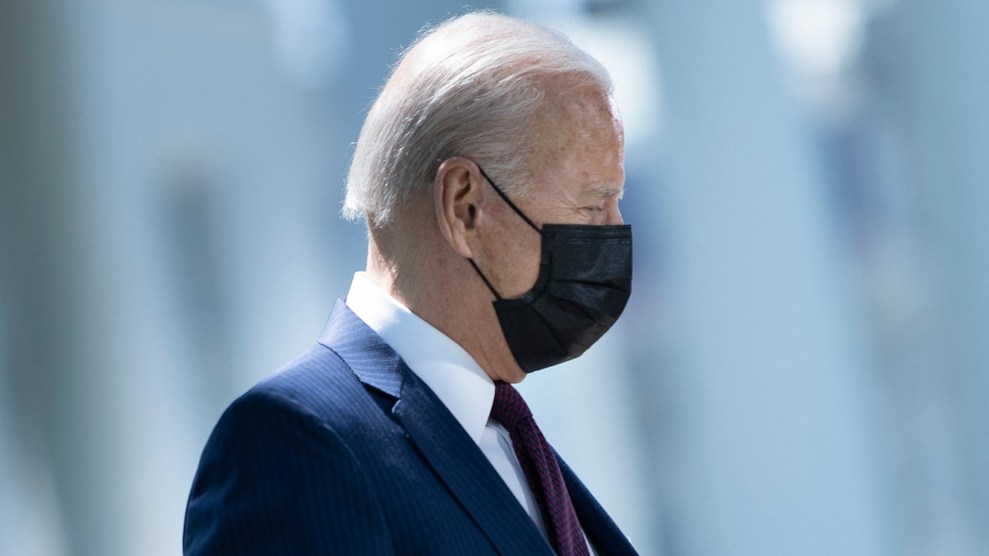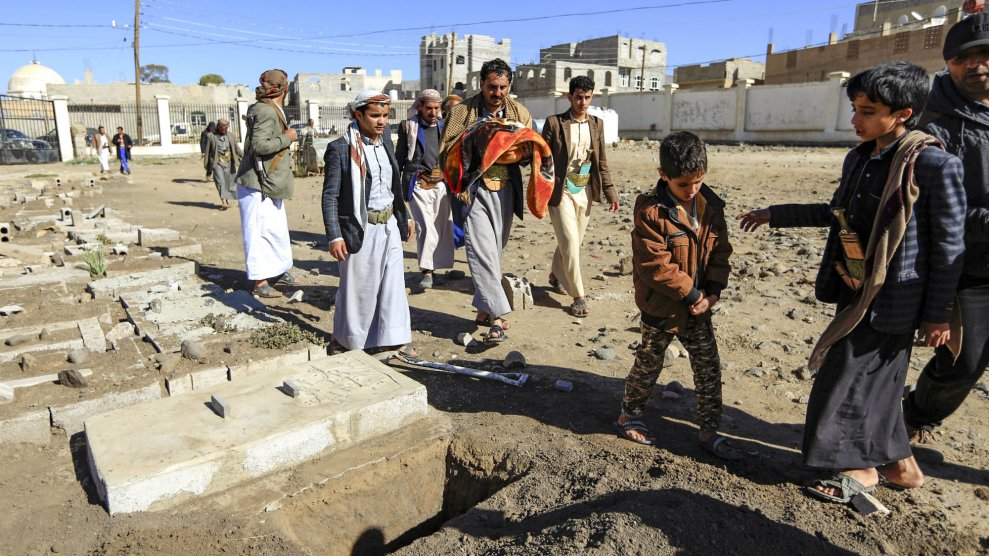
Brendan Smialowski/AFP/Getty
This year marks the 10th anniversary of the Egyptian revolution that toppled the three-decade rule of Hosni Mubarak and ushered in a chaotic sequence of crackdowns, a brief period of democratic reform, and finally a military coup led by Abdel Fattah el-Sisi, a man Donald Trump once called “my favorite dictator.”
Sherif Mansour, a 41-year-old activist who now serves as the Middle East and North Africa program coordinator at the Committee to Protect Journalists, has spent most of the last decade waging a rhetorical campaign against his homeland’s increasingly repressive rule—and the role of the United States in abetting it. His advocacy for political prisoners, journalists, and other free thinkers has not come free of consequence. Since he was a child, Sherif and various members of his family have spent time in Egyptian prison and weathered a storm of inexplicable, trumped-up charges from state prosecutors. Only two months ago, he was charged with terrorism in a case decried by human rights groups as a blatant attempt at intimidation.
“For me and for a lot of people, we didn’t choose to be in this fight,” he told me. “They came to my bed when I was 7 years old just because” of what his father, the secular Muslim scholar Ahmed Subhy Mansour, was writing.
The elder Mansour had long faced persecution from Egypt’s religious orthodoxy, which considers him a heretic for looking only to the Qur’an for religious guidance, not the teachings attributed to Muhammad—a view known as Qur’anism. Both Mansours were granted asylum in the United States—Ahmed in 2002, Sherif in 2007—and have kept up their criticism of Egypt’s authoritarian rule and its benefactors in the West.
Chief among these enablers is the United States government, which has shown a consistent willingness to look the other way on human rights abuses even while funneling military supplies and other aid to Egypt for decades. Since 1946, the United States has sent more than $84 billion in economic and military aid to Egypt, more than any other country except Israel and Afghanistan (if you take inflation into account, Egypt would rank second). Sherif, whose master’s thesis from Tufts University centered on the democratizing effect of foreign aid restrictions, has consistently drawn attention to the annual US tradition of sending Egypt roughly $1.3 billion in aid, a practice that both political parties have defended, sometimes in ways that strain credulity.
From the end of World War II through the late ’70s, the US gave only economic aid to Egypt. Military aid, which finances the Egyptian purchase of US weapons, did not become a significant part of the relationship between the two countries until Egypt and Israel signed a peace agreement in 1979. Over the next four decades, the United States ramped up its military aid to both countries while substantially reducing economic and humanitarian aid. Over the last five years, 89 percent of US aid to Egypt has gone toward military assistance.
President Joe Biden, who pledged during the campaign to give “no more blank checks” to el-Sisi, nonetheless kept the status quo in place when he approved the sale of nearly $200 million in missiles to Egypt in February, only days after the el-Sisi government arrested relatives of another Egyptian-American human rights activist. The decision did not go unnoticed by critics of the Trump administration’s friendly policy toward repressive regimes, critics who had hoped for change under Biden. “Whether or not this transfer is routine replenishment, as officials are claiming, the message of political support it communicates is unmistakable and goes against the spirit of the Biden Administration’s pledge to break with America’s past embrace of dictators,” said Elias Yousif of the left-leaning Center for International Policy, which tracks US arms sales.
El-Sisi, the last man standing after the wave of turmoil that swept Egypt a decade ago, has quickly become one of the world’s most brutal autocrats. After the Egyptian revolution at the dawn of the Arab Spring, Mubarak was ousted and, a year later, Egypt held the first democratic election in the country’s history. A new president, Mohamed Morsi, took power but his ties to the militant Muslim Brotherhood and attempt to undermine the Egyptian judiciary produced another wave of protests, resulting in a military coup spearheaded by el-Sisi, who was then the head of the armed forces. After the coup, Secretary of State John Kerry defended the military’s actions by saying, “In effect, they were restoring democracy.” (A US official later told the Wall Street Journal that Kerry “did not stick to the script.”) Under el-Sisi’s rule, the Egyptian government has stymied US efforts to promote higher education and civil society reform by enforcing draconian laws on organizations carrying out that work.
Periodic attempts to strip Egypt of its annual guarantee of US aid and weapons bubbled up in Congress after the coup, but the White House under President Obama never budged, even as Egypt grew more despotic. In 2014, el-Sisi captured the presidency with more than 95 percent of the vote, the kind of result rarely seen in a fair election. Once in office, el-Sisi ushered in an “unrepresentative, murderous government that is by far the most repressive ever seen in Egypt,” says Sarah Leah Whitson, executive director of Democracy for the Arab World Now, a nonprofit founded by journalist Jamal Khashoggi, whose state-sanctioned murder in 2018 sparked an international outcry against Saudi Arabia.
That Khashoggi, a US resident employed by a US newspaper, could be killed so brazenly by agents of a US ally would only be shocking if decades of American foreign policy had not served as precedent. The United States has rarely feared aligning itself with the worst kind of dictators in service of some ostensible national interest. Saudi Arabia’s rulers have not faced severe consequences for their brutality, but the Biden administration did, at last, end “offensive” support for the Saudis’ military intervention in Yemen. Even if it means nothing practically, Saudi Arabia no longer enjoys the benefit of the doubt among US citizens.
Sherif believes Egypt’s reckoning is next. “I saw no difference [between] the rapid response team that killed Khashoggi” and “ones that have done the same things in Egypt,” he said, adding that Congress has “a lot of tools [at its] disposal and, if they are actually serious about taking action, this is the time and it is now.”
Congress has long been concerned with the deteriorating human rights situation in Egypt, but rarely has assembled enough support to seriously address it. Under Trump, the problem became even more acute as El-Sisi kept up to six US citizens in jail even as the president welcomed him twice to the White House and showered him with praise. “We’ve never had a better relationship, Egypt and the United States, than we do right now,” Trump said during el-Sisi’s 2019 visit.
In January 2020, Sens. Patrick Leahy (D-Vt.) and Chris Van Hollen (D-Md.) urged the State Department to punish Egypt over the death of Moustafa Kassem, an American citizen who had been detained in Egypt for more than six years. Kassem, a soft-spoken auto-parts dealer from Long Island, was visiting family in Egypt when a soldier saw his US passport at a military patrol in Cairo and accused him of being a spy. After a show trial where he was accused of trying to overthrow el-Sisi, Kassem was thrown in prison under conditions his brother-in-law painstakingly recalled in a New York Times op-ed. “The cells are filthy, infested with insects, rodents and snakes,” his brother-in-law wrote. “They have no ventilation, sun or light. [Kassem] and other prisoners have no access to clean water, a bed, a chair or any books.”
After Kassem’s death, the State Department considered cutting $300 million in aid to Egypt, but decided against it. El-Sisi had earned Trump’s favor from an early and consistent flattery campaign. He became the first foreign leader to congratulate Trump on his victory in November 2016 and, during Trump’s first foreign trip, he met with el-Sisi in Saudi Arabia. Later, Trump made headlines by calling el-Sisi “my favorite dictator” at a G7 summit in 2019.
Biden took pains during the campaign to distinguish his approach from Trump’s. In July, when an Egyptian American medical student was released after being detained for 486 days, Biden pledged on Twitter to give el-Sisi “no more blank checks”:
Mohamed Amashah is finally home after 486 days in Egyptian prison for holding a protest sign. Arresting, torturing, and exiling activists like Sarah Hegazy and Mohamed Soltan or threatening their families is unacceptable. No more blank checks for Trump’s "favorite dictator." https://t.co/RtZkbGh6ik
— Joe Biden (@JoeBiden) July 12, 2020
Congress, unable to muster a lasting challenge to the US-Egypt relationship under Trump, had an opening with his successor, whose election was celebrated by activists like Mohamed Soltan, a former political prisoner who accused the Egyptian government of torturing him while in custody. The key to congressional action, as Sherif Mansour had long preached, was a willingness to tie Egypt’s aid package to human rights reform.
Normally the State Department can waive any human rights conditions on aid to Egypt for “national security” reasons, but late last year, Congress set aside $75 million that is not subject to a waiver. The only way for Egypt to receive this funding is if Secretary of State Antony Blinken determines that Egypt “is making clear and consistent progress in releasing political prisoners and providing detainees with due process of law.” For a country receiving $1.3 billion in US aid, the loss of $75 million—or, just under 6 percent of the total—does not seem particularly alarming. But it sends a signal, as Erica Fein, advocacy director at the progressive group Win Without War, told me, that “Congress is feeling empowered on Egypt and other issues to push back,” knowing that lawmakers will be held accountable “if they’re not willing to say the same things they said under Trump under the Biden administration.”
That promise came under scrutiny in February when family members of Soltan—the same activist who cheered Biden’s electoral win—were detained in Egypt. Days later, the Biden administration approved the sale of $197 million worth of missiles to Egypt. In a statement accompanying the announcement, the State Department said the “sale will support the foreign policy and national security of the United States by helping to improve the security” of an ally “that continues to be an important strategic partner in the Middle East.” (“We will continue to engage the Egyptian government on the importance of not arresting or prosecuting journalists,” a senior Biden administration official told me when asked about the administration’s policy, noting that Egypt released three journalists from detention.)
I recently spoke with Aly Hussin Mahdy, an Egyptian engineer who drew the ire of el-Sisi’s government by calling for protests among the Egyptian diaspora community to commemorate the 10th anniversary of the Egyptian revolution. Mahdy’s father, uncle, and cousin “are now held as hostages” in Egypt, he wrote in a Washington Post op-ed. His father “was reportedly tortured so severely he lost functionality in his right leg, and newly sustained wounds from beatings put him at risk for further infections.”
Mahdy is not a US citizen, but he was granted asylum in 2019 and now lives outside of Chicago. When I asked him about the Biden team’s approach to Egypt thus far, he said, “I didn’t find the expected response from the Biden administration, to be honest,” adding that he had hoped that Biden would delay “weapon sales until the regime in Egypt” changes its behavior and shows its people “respect.”
Whitson was even more blunt. “The problem,” she told me, “is that there is no real rethinking of the assumptions that underlie continued US military aid to Egypt.”
A State Department report released last month detailed Egypt’s routine practice of torturing detainees, even those as young as 12, and harassing activists like Mansour and Mahdy by detaining their family members who are still in Egypt.
Earlier this month, Egypt’s former investment minister went so far as to say the United States must restrict aid—an extraordinary position for any Egyptian civil servant to hold, even one that served under Morsi. “Ending this aid—as opposed to pretending to condition it on human rights reforms—is the only way to end Sisi’s cruel confidence that he can do whatever he wants to his people, and still be the recipient of American largesse,” Yehia Hamed wrote. “Calling for the U.S. to stop aiding Egypt is not a call I make lightly. I know very well how the regime’s propagandists will spin it as unpatriotic.”
Nonetheless, he added: “The reality is that America’s economic and military aid have had no positive impact on Egyptian citizens’ lives or security.”















